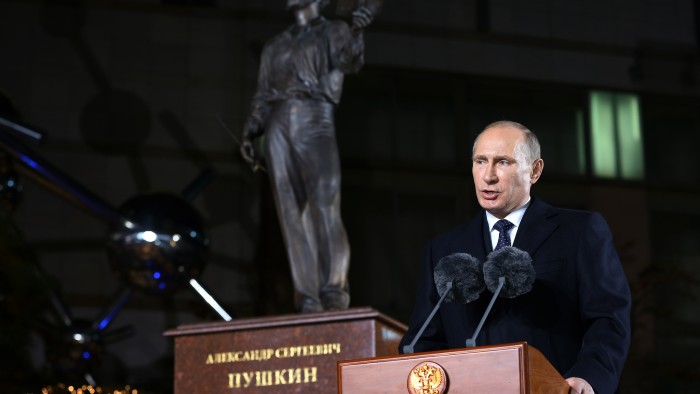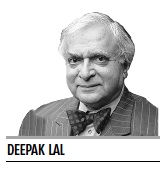 Putin’s latest global moves should be seen in the context of a possible ouster from power back home
Putin’s latest global moves should be seen in the context of a possible ouster from power back home
With the death of Marxism in Russia and China, its leaders are struggling to find a new ideology to justify their authoritarianism. As Boris Yeltsin said a few years after the collapse of the Soviet Union, "in Russian history during the 20th century, there have been various periods – monarchism, totalitarianism, perestroika, and finally a democratic path of development. Each stage has its own ideology," he continued, but now "we have none". (see Anton Barbashin and Hannah Thoburn "Putin’s Brain", Foreign Affairs, March 2014). In 1996, Yeltsin asked a group to define the "Russian Idea", but they could not.
A collection of conservative thinkers and politicians calling themselves Soglasiye vo imya Rossiya also took up the task. They were disturbed by the weakness of the Russian state, which they believed needed to be fixed for Russia to return to its rightful glory, by returning to the Russian tradition of a powerful central government. Vladimir Putin, with ties to the Soglasiye, agreed. After he had stabilised the Russian economy with rising oil prices, he returned to the Russian idea. Russia, he argued, was a unique civilisation, which could not be made to fit comfortably into European or Asian boxes, and had to live by its own uniquely Russian rules and morals. With the help of the Orthodox Church, he began a "battle against the liberal (Western) traits that some segments of Russian society had started to adopt." This led to his criminalisation of "homosexual propaganda" and the jailing of the pop-group Pussy Riot for hooliganism. These actions were popular in Russia.
Mr Putin’s conservatism, unlike that in the West, which puts the individual first, sees individuals as serving the state. It draws on a long tradition of Russian imperial conservatism and, in particular, Eurasianism. It is authoritarian, traditional, anti-American and anti-European; it values religion and public submission, and it is expansionist.
The ideologue of this contemporary Russian conservatism is Alexander Dugin, who believes with Mr Putin, that "the collapse of the Soviet Union was the greatest geopolitical catastrophe of the century." Like classical Eurasianists of the 1920s and 1930s, his ideology is "anti-Western, anti-liberal, totalitarian, ideocratic, and socially traditional. Its nationalism is not Slavic-oriented (although Russians have a special mission to unite and lead) but also applies to other nations of Eurasia. And it labels rationalism as Western and thus promotes a mystical, spiritual, emotional, and messianic world view." Mr Dugin and his followers have strongly endorsed Mr Putin’s action in Ukraine, "calling on him to go further and take east and south of Ukraine". Russians seemed to agree, with Mr Putin’s ratings climbing.
In line with this neo-Eurasianism, Mr Putin’s confrontation with the West over Ukraine has also made him turn east to China, to create what some observers have characterised as a "League of Dictators". Both authoritarian regimes "feel threatened by Western universalist values and a belief that economic growth and stability are preferable to imported notions of democracy" (Edward Lucas, The New Cold War). Though the two countries may make common cause, they are not natural allies. Andrei Piontkovsky calls it "an alliance between a rabbit and a boa constrictor" (Lucas, p. 265). It is unlikely to last.
 Whether or not Mr Putin is a true believer in the Dugin ideology, there may be a much simpler explanation for Mr Putin’s nationalist turn. Andrew Kuchins ("Putin Goes Nationalist", Sigur Center for Asian Studies, Policy Brief, April 2015) has argued that Mr Putin, who came to power as a great power balancer, moving at times to the liberal westerniser camp and then to the Russian nationalist camp, has with his annexation of Crimea and support for the hybrid war in Eastern Ukraine firmly moved into the Russian nationalist camp, largely to consolidate his own political position. His high popular ratings during his first presidency were due to Russia’s robust economic growth and the resulting rise in living standards. But when he returned to the Presidency in 2012, growth stagnated to only 1.3 per cent in 2013, and close to zero when he annexed Crimea. The ruble was losing value, and capital flight was at an all -time high. This was reminiscent of the 1980s, when despite massive inflows of petrodollars the economy was stagnant with economic growth close to zero. This, like today was because of the failure to undertake structural reforms and endemic corruption. Mr Putin is unwilling – like his Soviet predecessors – to undertake the needed reforms which would hurt the vested interests on which his power rests. Without economic growth and prosperity providing the basis of his popularity, he played the nationalist card, on the line of Mr Dugin’s ideology. His political instincts, "as they so often have been over his now 15-year tenure in power, were right on target as his popularity ratings immediately jumped about 25 points putting him into the high 80s, where they have remained as the war in Eastern Ukraine expanded with not-so-covert support from Moscow".
Whether or not Mr Putin is a true believer in the Dugin ideology, there may be a much simpler explanation for Mr Putin’s nationalist turn. Andrew Kuchins ("Putin Goes Nationalist", Sigur Center for Asian Studies, Policy Brief, April 2015) has argued that Mr Putin, who came to power as a great power balancer, moving at times to the liberal westerniser camp and then to the Russian nationalist camp, has with his annexation of Crimea and support for the hybrid war in Eastern Ukraine firmly moved into the Russian nationalist camp, largely to consolidate his own political position. His high popular ratings during his first presidency were due to Russia’s robust economic growth and the resulting rise in living standards. But when he returned to the Presidency in 2012, growth stagnated to only 1.3 per cent in 2013, and close to zero when he annexed Crimea. The ruble was losing value, and capital flight was at an all -time high. This was reminiscent of the 1980s, when despite massive inflows of petrodollars the economy was stagnant with economic growth close to zero. This, like today was because of the failure to undertake structural reforms and endemic corruption. Mr Putin is unwilling – like his Soviet predecessors – to undertake the needed reforms which would hurt the vested interests on which his power rests. Without economic growth and prosperity providing the basis of his popularity, he played the nationalist card, on the line of Mr Dugin’s ideology. His political instincts, "as they so often have been over his now 15-year tenure in power, were right on target as his popularity ratings immediately jumped about 25 points putting him into the high 80s, where they have remained as the war in Eastern Ukraine expanded with not-so-covert support from Moscow".
However, Forbes has reported that, despite his overwhelming ratings, Kremlinologists are sensing "a putsch in the air" against Mr Putin. (Paul Roderick Gregory, Forbes, 20 August 2015). The Politburo 2.0, which currently runs Russia, is worried about Mr Putin’s next moves in the Ukraine. If he pulls his assets from the pro-Russian rebels, he and the Politburo will be labelled losers. If he launches a new offensive to get a land bridge to Crimea, the West will impose sanctions, putting the assets of the Politburo at risk. "Sanctions may include the ‘nuclear option’ of expelling Russia from the SWIFT banking transfer system and bring Russian financial transactions to a standstill. Those who benefited from Mr Putin’s kleptocracy would face ruin." To avoid this, an end of the Putin regime would have to be engineered. "Putin would have to either resign or cease to exist. Indicators suggest that the process would begin with an assault on Putin’s closest associates, which appears underway."
Whether or not a coup against Mr Putin materialises, and if it does whether his successors will repudiate Russia’s anti-Western stance and turn again to the liberal structural reforms needed to resuscitate the Russian economy remains, in Donald Rumsfeld’s phrase, a "known unknown". It is in this context that Mr Putin’s latest moves in the Syrian civil war should be seen. By introducing himself into the conflict on the side of his old ally, Bashar al Assad, he first sends a signal that, unlike the feckless Mr Obama, he will stick by his allies. Second, that with his air bases in Latakia, a NATO enforced no-fly-zone as proposed by Turkey and rejected by Mr Obama, is no longer possible. Third, by fighting ISIS he hopes to reduce the jihadist threat to the Caucasus. Fourth, he has made Russia an essential player in determining the fate of the past dominions of the Ottoman Empire, an outcome that British imperial policy had always sought to prevent. Finally, and most important, by offering the hope of slowing the swarm of migrants fleeing the Syrian civil war, he offers Europe hope of easing its migration crisis, in exchange for the weakening or removal of the sanctions imposed after his Ukraine adventure, which would reduce the pressures on him from his Politburo 2.0.
First published at the Business Standard and posted here with the kind permission of the author.
Deepak Lal is the James S. Coleman Professor Emeritus of International Development Studies at the University of California at Los Angeles, professor emeritus of political economy at University College London, and a senior fellow at the Cato Institute. He was a member of the Indian Foreign Service (1963-66) and has served as a consultant to the Indian Planning Commission, the World Bank, the Organization for Economic Cooperation and Development, various UN agencies, South Korea, and Sri Lanka. From 1984 to 1987 he was research administrator at the World Bank. Lal is the author of a number of books, including The Poverty of Development Economics; The Hindu Equilibrium; Against Dirigisme; The Political Economy of Poverty, Equity and Growth; Unintended Consequences: The Impact of Factor Endowments, Culture, and Politics on Long-Run Economic Performance; and Reviving the Invisible Hand: The Case for Classical Liberalism in the 21st Century.

